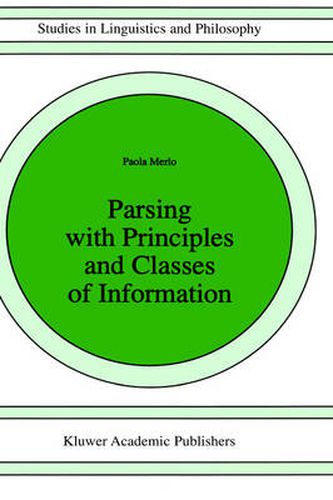Readings Newsletter
Become a Readings Member to make your shopping experience even easier.
Sign in or sign up for free!
You’re not far away from qualifying for FREE standard shipping within Australia
You’ve qualified for FREE standard shipping within Australia
The cart is loading…






This title is printed to order. This book may have been self-published. If so, we cannot guarantee the quality of the content. In the main most books will have gone through the editing process however some may not. We therefore suggest that you be aware of this before ordering this book. If in doubt check either the author or publisher’s details as we are unable to accept any returns unless they are faulty. Please contact us if you have any questions.
This text, based on principle-based linguistic theories for English, argues that differences in the kind of information being computed, whether lexical, structural or syntactic, play a crucial role in the mapping from grammatical theory to parsing algorithms. The direct encoding of homogeneous classes of information has computational and cognitive advantages, which are discussed in detail. Phrase structure is built by using a fast algorithm and compact reference tables. A quantified comparison of different compilation methods show that lexical and structural information are most compactly represented by separate tables. This finding is reconciled to evidence on the resolution of lexical ambiguity, as an approach to the modularization of information. The same design is applied to the efficient computation of long- distance dependencies. Incremental parsing using bottom-up tabular algorithms is discussed in detail. Finally, locality restructions are calculated by a parametric algorithm. Students of linguistics, parsing and psycholinguistics should find this a useful resource on issues related to the implementation of linguistic theories, using computational and cognitive plausible algorithms.
$9.00 standard shipping within Australia
FREE standard shipping within Australia for orders over $100.00
Express & International shipping calculated at checkout
Stock availability can be subject to change without notice. We recommend calling the shop or contacting our online team to check availability of low stock items. Please see our Shopping Online page for more details.
This title is printed to order. This book may have been self-published. If so, we cannot guarantee the quality of the content. In the main most books will have gone through the editing process however some may not. We therefore suggest that you be aware of this before ordering this book. If in doubt check either the author or publisher’s details as we are unable to accept any returns unless they are faulty. Please contact us if you have any questions.
This text, based on principle-based linguistic theories for English, argues that differences in the kind of information being computed, whether lexical, structural or syntactic, play a crucial role in the mapping from grammatical theory to parsing algorithms. The direct encoding of homogeneous classes of information has computational and cognitive advantages, which are discussed in detail. Phrase structure is built by using a fast algorithm and compact reference tables. A quantified comparison of different compilation methods show that lexical and structural information are most compactly represented by separate tables. This finding is reconciled to evidence on the resolution of lexical ambiguity, as an approach to the modularization of information. The same design is applied to the efficient computation of long- distance dependencies. Incremental parsing using bottom-up tabular algorithms is discussed in detail. Finally, locality restructions are calculated by a parametric algorithm. Students of linguistics, parsing and psycholinguistics should find this a useful resource on issues related to the implementation of linguistic theories, using computational and cognitive plausible algorithms.